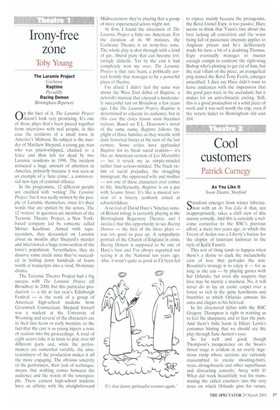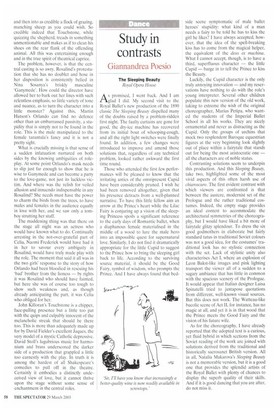Cool customers
Patrick Carnegy
As You Like It Swan Theatre, Stratford
Stratford emerges from winter hibernation with an As You Like Jr that, not inappropriately, takes a chill view of this uneasy comedy. And this is certainly a welcome corrective to the RSC's previous effort, a mere two years ago, in which the Forest of Arden was a Liberty's bazaar for the display of luxuriant knitwear in the style of Kaffe Fassett.
This sort of thing tends to happen when there's a desire to duck the melancholic view of love that pervades the text. Rosalind's strategy is to enjoy it — for as long as she can — by playing games with her Orlando, but even she suspects that love may be merely a madness. No, it will never do to lay an exotic carpet over a forest so rich in the spiny hawthorns and brambles to which Orlando entrusts his odes and elegies to his beloved.
In his directorial debut with the RSC Gregory Thompson is right in wanting us to feel the sharpness, and to fear the pain. And there's little harm in Hilary Lewis's costumes hinting that we should see the play through Jane Austen's eyes.
So far well and good, though Thompson's inexperience on the Swan's thrust stage is evident in an overly ingenious ramp whose sections are variously reassembled to create shooting-butts, trees, diving-boards and other superfluous and distracting conceits. Away with it What did work beautifully was his transmuting the exiled courtiers into the very trees on which Orlando pins his verses, and then into as credible a flock of grazing, munching sheep as you could wish. So credible indeed that Touchstone, while quizzing the shepherd, treads in something unmentionable and makes as if to clean his shoes on the rear flank of the offending animal. All this was entertaining enough and in the true spirit of theatrical caprice.
The problem, however, is that the central casting is so awry. Rosalind's protestation that she has no doublet and hose in her disposition is consistently belied in Nina Sosanya's briskly masculine `Ganytnede'. How could the director have allowed her to bark out her lines with such relentless emphasis, so little variety of tone and nuance, as to turn the character into a little monster? Against this, Martin Hutson's Orlando can find no defence other than an embarrassed passivity, a stupidity that is simply not to be found in the role, This is the male manipulated to the female tarantula's fancy and it is not a pretty sight.
What is crucially missing is that sense of a sudden infatuation nurtured on both sides by the knowing ambiguities of roleplay. At some point Orlando's mask needs to slip just far enough to show that he is wise to Ganymede and can become a party to the love-game, not just its luckless victim. And where was the relish for veiled allusion and innuendo indispensable in any Rosalind? She needs must have the power to charm the birds from the trees, to have males and females in the audience equally in love with her, and we saw only a tomboy strutting her stuff.
The maddening thing was that there on the stage all night was an actress who would have known what to do. Continually arresting in the not-over-grateful part of Celia, Naomi Frederick would have had it in her to savour every ambiguity in Rosalind, would have truly made play with the role. The moment that said it all was in the two girls' response to the story of how Orlando had been bloodied in rescuing his 'bad' brother from the lioness — by rights it was Rosalind who should have fainted, but here she was of course too tough to show such weakness and, as though already anticipating the part, it was Celia who obliged for her.
John Ki'loran's Touchstone is a chipper, face-pulling presence but a little too pat with the quips and culpably innocent of the melancholic streak that should be there too. This is more than adequately made up for by David Fielder's excellent Jaques, the very model of a mystic Catholic depressive. David Stoll's lugubrious music for harmonium and brass underscored the darker side of a production that grappled a little too earnestly with the play. In truth it is among the hardest of all Shakespeare's comedies to pull off in the theatre. Certainly it embodies a distinctly undeceived view of love, but it cannot thrive upon the stage without some sense of enchantment in the central roles.









































































 Previous page
Previous page